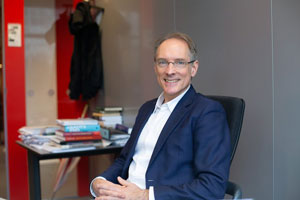Peter Grünwald, senior researcher in the Machine Learning group at CWI and part-time professor of Statistical Learning at Leiden University, has been awarded an ERC Advanced Grant. The grant, totaling 2.5 million euros, supports his research into developing a new theory of statistics.

Peter Grünwald. Photo source: CWI
Grünwald’s work introduces the concept of the e-value, which often proves more effective than the p-value in determining the significance of scientific results. This breakthrough addresses the flaws in the current methodologies which rely on p-values and confidence intervals, established in the 1930s and inadequate for scientific processes.
Traditional statistical methods, including p-values and confidence intervals, often lead to a incidence of false positives, contributing to what is known as the ‘replication crisis’ in science. These methods lack the flexibility required for research practices, where data are frequently added and analyses recalculated, particularly in experiments. The e-value, according to Grünwald, calculates the strength of evidence against a hypothesis, ranging from zero to infinity. A e-value indicates evidence that results are significant. This new approach allows for the addition of data at any point and the recalibration of the e-value without losing its interpretative power. Unlike methods, e-value-based confidence intervals remain valid no matter when or how often they are reviewed.
Grünwald’s research proposal aims to replace traditional methods with these e-value-based techniques. This development promises to revolutionize statistical practices, making them adaptable to various scientific needs and reducing reliance on large data sets.
Grünwald expressed his gratitude for the EU's support of his approach, emphasizing that the new methods will enhance the safety and flexibility of statistical analyses, leading to more conclusions with less data.
More information: https://www.cwi.nl/en/news/erc-advanced-grant-for-peter-grunwald-for-research-on-a-revolutionary-statistical-theory/











